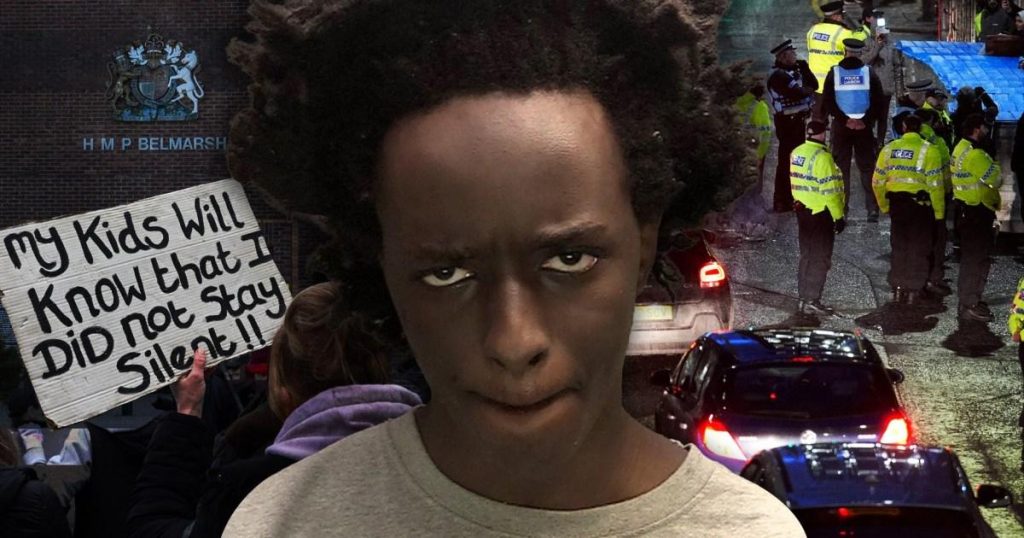The Heinous Crime and Swift Justice:
On a seemingly ordinary day in Southport last July, a horrific tragedy unfolded, leaving a community shattered and grieving the loss of three innocent young lives. Axel Rudakubana, an 18-year-old, perpetrated a brutal attack that claimed the lives of nine-year-old Alice da Silva Aguiar, six-year-old Bebe King, and seven-year-old Elsie Dot Stancombe. Beyond the unimaginable grief caused by their deaths, Rudakubana also attempted to murder eight other children, their class instructor, and a local businessman. The sheer scale of the violence and the tender age of the victims sent shockwaves through the community and beyond. Swiftly apprehended by authorities, Rudakubana’s chilling confession, “I’m so glad the children are dead, so glad," cemented his depravity in the minds of the public and solidified the prosecution’s case. This unrepentant admission of guilt, coupled with overwhelming evidence, led to his conviction and the imposition of a life sentence with a minimum term of 52 years. His incarceration began at Belmarsh Prison, a high-security facility known for housing some of the UK’s most dangerous criminals.
A Life of Torment Within Prison Walls:
The severity of Rudakubana’s crimes ensures a grim and isolated existence within the confines of Belmarsh Prison. Experts, including Mark Fairhurst, national chairman of the Prison Officers’ Association, predict a life of constant fear and potential violence for the child killer. Branded as "target No. 1," Rudakubana is expected to face the unremitting wrath of fellow inmates, who have their own code of justice and consider crimes against children to be the most heinous. The prison environment, already harsh and unforgiving, becomes exponentially more dangerous for individuals who have committed such reprehensible acts. Even the relative protection offered by segregation, a measure employed to isolate vulnerable prisoners, may not be enough to shield him from the ever-present threat of violence. The constant vigilance required to survive, the ever-present fear of reprisal, and the knowledge of his heinous crimes will likely create a psychological hell for Rudakubana.
The Victims’ Families: Navigating Unfathomable Grief:
The families of the murdered children have been left with an unimaginable void in their lives. Their statements reflect the profound love they had for their children and the devastating impact of their loss. Jenny Stancombe, mother of Elsie Dot Stancombe, described Rudakubana as "cruel and pure evil," his attack an act of cowardice that robbed her of her daughter’s bright future. The parents of Alice da Silva Aguiar painted a vivid picture of a vibrant young girl full of life, stolen from them in the most horrific way. Their words convey the utter devastation of losing a child so full of promise. Bebe King’s parents spoke of their daughter’s joy, light, and love, a constant reminder of the beautiful soul taken too soon. The outpouring of support from their community has offered some solace, but the pain of their loss remains a constant presence.
The Long Shadow of Grief and the Pursuit of Justice:
The ripple effects of this tragedy extend far beyond the immediate families of the victims. The Southport community remains deeply scarred, struggling to comprehend the senseless violence that shattered their sense of security. The attack serves as a stark reminder of the vulnerability of children and the importance of safeguarding their well-being. The case has also reignited discussions about the appropriate punishment for such heinous crimes, with some advocating for even harsher sentences. While the legal system has delivered its verdict, the emotional and psychological toll on the community will likely persist for years to come. The quest for healing and understanding will be a long and arduous journey.
The Prison System and the Challenge of Inmate Safety:
Rudakubana’s case highlights the complex and often volatile nature of the prison system. While the primary function of prisons is to incarcerate offenders and protect the public, the safety of inmates within those walls is also a critical concern. The potential for violence against individuals like Rudakubana underscores the challenges faced by prison authorities in maintaining order and preventing harm. Balancing the need for punishment with the duty of care for all prisoners presents an ongoing dilemma. The inherent dangers within the prison environment, coupled with the intense emotions surrounding crimes against children, create a volatile mix that demands constant vigilance and proactive measures to prevent violence.
The Societal Impact of Violent Crime:
The horrific events in Southport serve as a somber reminder of the devastating consequences of violent crime. The loss of innocent lives, the shattered families, and the traumatized community all bear witness to the far-reaching impact of such acts. These tragedies underscore the urgent need for societal reflection and action to address the root causes of violence and create safer communities for everyone. The long and arduous process of healing, both for the affected families and the wider community, will require time, support, and a collective commitment to preventing such tragedies from happening again. The memories of Alice, Bebe, and Elsie will forever serve as a poignant reminder of the preciousness of life and the importance of working towards a future free from violence.


